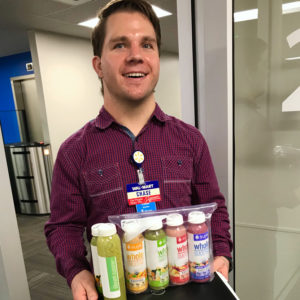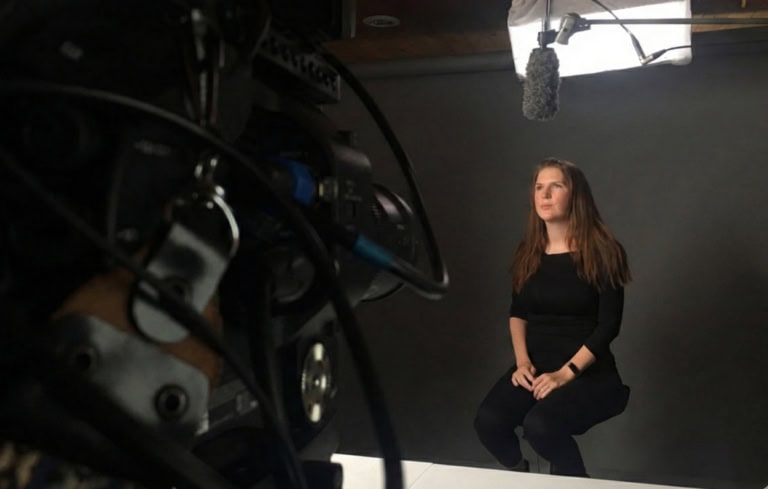
New products come and go quickly at big-box retailers. If you pay attention, you’ll begin to recognize patterns.
That’s what Chase Worthen did as a Walmart food buyer in Bentonville, Ark. Now he’s taking that knowledge and applying it to his new CPG venture, which has earmarked Austin to be a major distribution hub.

Worthen, 31, is founder & CEO of plant-based products brand Enliven Foods. His playbook is based largely on the many failed products he witnessed.
“Companies would get a lot of distribution,” he said. “But they didn’t have that groundswell of customers who really love their brands. They may be on the shelf for 3-6 months, but then didn’t perform.”
Worthen reflects on one category in particular.
“In 2014-2015, cold-pressed juice started to really boom,” he said. “One of the biggest direct-to-customer (cold-pressed juice companies) had unique formulations. We decided to partner with them. At rollout, the marketing was delayed. There was a lot of talk to get it onto the shelves. The follow-through wasn’t there.
“What I found out later on – one of the major downfalls we see – they focused on too many things at once.”
Seeing buzzworthy companies flame out also influenced Worthen’s approach to fundraising.
“A lot of consumer packaged goods companies get a ton of money at the beginning and ramp up and then have to raise a number of more rounds of funding before they become profitable,” he said. “We want to be profitable from the beginning. We want to make sure we create a premium product with a good market fit and figure out how to invest $1 and get $10 back with a 40 percent gross margin after shipping.”
Another reason Enliven Foods has eschewed investor dollars is because Worthen believes that CPG brands take longer than tech companies to scale – sometimes as long as 7-10 years – and they require plenty of direct customer interaction to succeed.
Slow-and-steady doesn’t fit the typical venture capital model.
A Health Battle Solved By A Plant-Based Diet
Worthen is forging ahead with $10,000 from his personal savings and two nutrition and packaged food-product experts who he met while at Walmart. Natural, plant-based foods is a crowded category, at about $4.5 billion and growing 31 percent a year, according to Good Food Institute. But there’s a personal side to Worthen’s story that may help the brand stand out.
At the Austin Fast Start pitch competition Jan. 9, he revealed his battle with irritable bowel syndrome (IBS).
“Over time, I found healing in just eating lots of fruits and vegetables,” he said.
Managing IBS with dietary changes made Worthen a believer in plant-based diets (a.k.a. veganism). He also worked at Walmart with Robin Jeep, a chef and author of “The Super Antioxidant Diet and Nutrition Guide,” and Mark Adams, of Virginia-based Performance Food Group, to develop a fruit-and-vegetable drink that was eventually sold under the Suja Juice brand.
These experiences motivated Worthen to bring plant-based foods to the masses.
“We know people can heal by eating a lot more plants,” he said. “We want to help make that transition by providing foods that are plant-based where there are gaps in the market. And then we are also working to provide educational content.”
The company’s first product is a just-add-water mix called Manna Muffins, which consists of almonds, coconut, beans, flax seeds, dates, spices, whole cacao, and other plants. It’s sold direct-to-consumer for roughly $10 a box on EnlivenFoods.com, and Worthen also sells at farmers markets. Their biggest competition is Muffin Revolution and Coconut Whisk.


Enliven’s staff currently works remotely, and Worthen’s family is in Austin, where he spends much of his time.
Worthen is aware of the city’s reputation as a launchpad for food brands such as High Brew Coffee, Chameleon Cold-Brew, and Siete Family Foods. Programs such as SKU, Austin’s 14-week consumer-product accelerator, have helped scale brands.
But it’s not easy for startups to know when to join these types of programs, said De J. Lozada, the founder of Austin’s Soul Popped Popcorn. Not many people even understand the difference between an incubator, which helps foster new ideas, and an accelerator, which helps fledgling businesses gain traction. Also, per Xconomy, SKU invests $10,000 in each company and takes a five percent equity stake.
“If you go into one at the wrong time, it can really hurt your business and your brand, and you can anticipate it can hurt your overall experience with the brand,” Lozada said.
Worthen expects a six-month runway, and he’s exploring crowdfunding campaigns, Kiva Loans, and perhaps a friends-and-family round. In the meantime, he enters the occasional pitch competition and spends much of his time experimenting with the product. He’s received input from product sampling and others.
“Family members actually give the most blunt feedback – sometimes they’ll tell you straight up how it is.”



